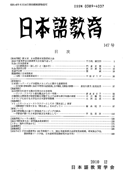Volume 176
Displaying 1-8 of 8 articles from this issue
- |<
- <
- 1
- >
- >|
Research Papers
-
2020Volume 176 Pages 1-15
Published: August 25, 2020
Released on J-STAGE: August 26, 2022
Download PDF (1022K)
REGULAR ISSUE
Reseach Papers
-
2020Volume 176 Pages 16-32
Published: August 25, 2020
Released on J-STAGE: August 26, 2022
Download PDF (665K)
Survey Articles
-
2020Volume 176 Pages 33-47
Published: August 25, 2020
Released on J-STAGE: August 26, 2022
Download PDF (639K) -
2020Volume 176 Pages 48-63
Published: August 25, 2020
Released on J-STAGE: August 26, 2022
Download PDF (591K) -
2020Volume 176 Pages 64-78
Published: August 25, 2020
Released on J-STAGE: August 26, 2022
Download PDF (604K)
Practical Articles
-
2020Volume 176 Pages 79-94
Published: August 25, 2020
Released on J-STAGE: August 26, 2022
Download PDF (1019K) -
2020Volume 176 Pages 95-109
Published: August 25, 2020
Released on J-STAGE: August 26, 2022
Download PDF (728K)
Research Notes
-
2020Volume 176 Pages 110-117
Published: August 25, 2020
Released on J-STAGE: August 26, 2022
Download PDF (466K)
- |<
- <
- 1
- >
- >|
